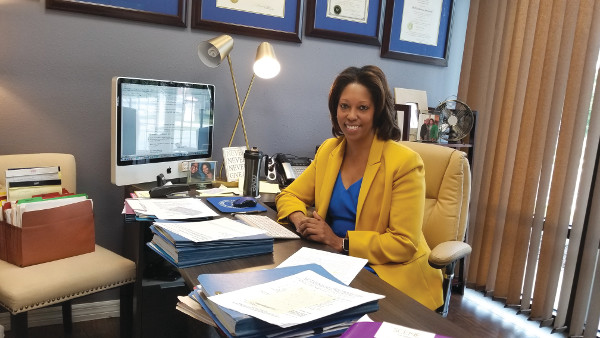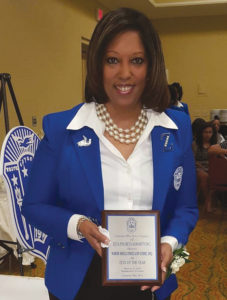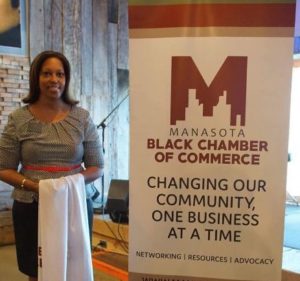
People
Scenes From an Interview
Sarasota Mayor Shelli Freeland Eddie
By Gus Mollasis
Her appointment book is filled; her days are full. As both a practicing attorney and the mayor of the city of Sarasota, there is little time to spare, and it is so precious. Shelli Freeland Eddie chooses to spend her precious time advocating, fighting and being committed to causes for which she is passionate about, like affordable housing and providing assistance to women who are in crisis situations.
Born in Louisville and educated at the University of Kentucky, Ms. Eddie moved to Sarasota with her parents, made it her home, and now spends every day tending to the needs of the folks who are both her constituents and friends. And she’s doing an outstanding job, as evidenced by the Presidential Award for Community Service she received in 2016 from President Obama’s administration.
As I sat down to talk with her, I could sense her passion and excitement about our city, as we took a look at some scenes from an interview from her life.
What did you want to be when you were a child?
I wanted to be a lawyer.
Did you wear the other hat and run for class president?
In high school and college, I was involved in student government. I always had one foot in that world.
What was the greatest lesson your mom and dad taught you?
They introduced me to Christ.
Is being mayor of Sarasota what you expected it would be?
(Smiles) Well, I had never done it before. I had no real frame of reference. As you know, by nature the city commission position is a part-time job, which it’s not; it’s way full-time. And the mayor is the ceremonial appointment. I didn’t know how involved it would be regarding staff and with meeting leaders of the community. I knew that there would be meetings and events and those types of things. For me, I wanted to be involved in policy decisions and really get into the weeds on some of our issues. Thankfully, they have been accommodating in allowing me to do that. Each mayor has a different personality and they work with who is there, and they’ve worked with me to allow me to have a seat at the table where possible. I didn’t know what to expect, so it’s been a learning experience.
What has been your biggest challenge and your greatest sense of accomplishment thus far?
The biggest challenge has been balancing traffic and development in our growing community, which is a compliment, but also a challenge. Biggest accomplishment I would say is that I’m really happy we were able to provide relief to our retired firefighters. It’s been a struggle to provide some assistance to the rising costs from insurance premiums from the city to our retirees. It’s been a struggle for the last several commissions. We actually moved the needle with this term, so I’m really proud to have been a part of that.
What is the one thing that you hope to accomplish during your term?
Affordable workforce housing in our community.
Are we getting closer?
We’re getting closer, but we still have a long way to go. But we’re just a piece of the puzzle. It takes the county; it takes developers; it takes nonprofits; it takes community. We’re all working together. It looks as if there is some momentum, and I’m happy about that.
Are some of these high-rise buildings that we are seeing downtown solving part of the equation?
No. They’re not affordable at all. And that’s why we still have work to do. So we’re going to look at other parts of the community where there is land where we can build. We’re going into the revision of our zoning code, the form-based code, and we’re going to be looking at zoning and some ways to make it easier for developers to be able to afford to build workforce housing. There has to be, in my opinion, a commitment and a want to do it by all of the stakeholders. We’re slowly getting there.
One of your other passions is helping women in crisis, and in particular with the Women’s Resource Center, where you offer some legal services. Tell us about that.
Both Women’s Resource Center and More Too Life are nonprofits that work with women in the community and they have an “Ask the Lawyer” segment. I go to each organization once a month and just have consultations with women. It could be someone homeless who needs help with housing. It could be someone newly divorced who needs to go back into the workplace. It could be a woman who, because of criminal consequences, had some rights terminated and wants to fix that process. At More Too Life, it is women and young girls who have been victims of sexual and human trafficking who are beginning to rebuild their lives legally and socially. Legally the state and the federal government are beginning to change and write laws that allow women to have their previous records sealed or expunged that were created out of their victimization. A case in point is a woman who was involved in sexual trafficking often has several prostitution charges and convictions. Well, that woman or young lady was forced into that lifestyle because she was a victim of human trafficking. The legal result is that she’s been arrested and convicted several times for prostitution. So now she’s on the other side of recovery, trying to rebuild her life, trying to gain employment, trying to be a good candidate for stable housing. But now she has a record and doesn’t qualify for housing assistance. So we’re working with state lawmakers to remove those barriers which were not her fault.
 What did you feel when you received an award for community service from the Obama Administration?
What did you feel when you received an award for community service from the Obama Administration?
It was an honor. Number one because I didn’t even know that it existed and to receive the letter, the certificate and the pen from him was just special. It kind of reminds you that we are still in this together.
Describe the challenge of balancing your time between being an attorney and mayor.
It is time and it is tough. Part of the problem for me is that in order for the city to move forward, they will have to decide if they want the mayor’s position to be a full-time position so that folks can give it their all and not be divided if they’re vocational. For me as a business owner, I have the ability to make myself available to attend to the needs of the city, but it’s at a balance to my career. For folks who are looking to get involved and get engaged, they don’t always have that luxury of either being self-employed, having their own schedule, and being able to afford to reduce what they might make so that they can serve. For me, it’s been a struggle from a time perspective. But also there are times when one life flows into the other. We might be in a commission meeting until midnight and I have a trial the next morning. So I have to plan and work differently.
What is your best quality as a city leader?
I think two things. One is my ability to listen and put myself in the other person’s shoes. The other is to be prepared to discuss the issues. I pride myself in knowing what we’re supposed to talk about. It does not mean I have all the answers, it just means I’m prepared to discuss the issue and that I’ve taken the time to get the background information to ask the right questions. I think that’s critical. I think the city deserves informed commissioners.
The homeless issue is complex. How do you strike a balance between being compassionate and helping downtown business owners who say that vagrant loitering hurts their business?
I think we continue to offer services and work on our housing crisis, which is not only for working families, but also for chronic homeless. I also think we have a responsibility as law enforcement that if a law is being broken, we should do enforcement. We’re doing all three. Our hot teams are the leaders on the city side in terms of educating individuals who are homeless to make sure that they are aware of services, options and resources that we offer, while at the same time attend to the concerns of our business owners who desire a clean and safe place to do business that attracts folks so that their bottom line is not impacted. Providing resources for both helps not pit the two against each other.
What is the one issue regarding the city that keeps you up at night?
Again, it’s housing. I get the benefit of meeting with so many different groups of people in various community centers. For a teacher or person who works in retail, or in a restaurant, or in health care, they have good jobs that are steady paying, but it doesn’t keep up with the cost of living. They are driving to work in Sarasota from North Port and Parrish, and sometimes even coming from St. Pete and Pinellas County. They drive back because they can’t afford to live here. That quality of life is in part what contributes to our traffic concerns and congestion. But it also creates a distressed work force in my opinion, because you sit on I-75 to get to work. What do we have to do to get to a place where you can afford to live in the city where you work? It’s not a one-party solution. We’re all going to have to see how we can all play a role. This is an issue that continues to be a challenge for me because, if you think about it from the 30,000-foot view, how does it impact industry? How does it impact traffic? How does it impact your workforce? What about the college student who would like to come back here and work? I think affordable housing is definitely a tool in attracting college students who’ve graduated to at least give us a second look. We are implementing on-the-job training in colleges and vocational schools where people are given the skills to start out, but we’re not providing them with affordable housing options so that they can stay here. We also have our established retirees who live on fixed incomes, and now because of rises in property tax values, they are beginning to be priced out of their homes. Then we have our low and very low-income residents who will never get out of public housing, which is supposed to be temporary and not a permanent place. There are so many different dynamics to the affordable housing question and issue.
Do you have a mantra that you live by?
I don’t think there’s just one. I try to live by the faith principles I was raised on and what I believe. But I also try not to judge folks. It’s easy for us to assume why somebody does what they do, and you can place anybody into that person. It could be our development community; it could be an individual; it could be the person who has found themselves homeless; it could be the low-income worker; it could be any of us. And life happens and we are very quick to judge. We blame them for circumstances. Practicing as a defense attorney in the community and seeing folks who are at their worst, I have learned that we treat people like we want to be treated and we expect and believe the best about people and we don’t judge an entire group based upon a decision that one person may have made. To me it’s just using fairness. That doesn’t mean that there aren’t consequences either, because there is order. There are times, and criminal law is an example, where if a crime has been committed, and facts have been proven, then there should be consequences. But we also have the ability to fashion a remedy that makes both the community and the person better on the other side of it. mayor mayor mayor mayor mayor mayor mayor mayor mayor mayor mayor mayor
Years from now, what do you hope for you and for Sarasota?
For me family is important. Years from now I hope to be married with a family, and hopefully raise a child or children who have a mindset of service and not see color, and work with folks and do the work that needs to be done. For our community, I hope that if we raise our children in that way then we will have the kind of community that we like to see and live in. But we also have to be willing to be able to sacrifice some of what we have in order for others to get what they need. mayor mayor mayor mayor
And this town does that in bushels?
It does to a certain extent. But if you ask people how they feel about affordable housing, they assume that affordable housing means poor, lazy people who more likely than not are persons of color. That’s a negative mindset that needs to be addressed. It’s not about that. It’s about working families. It’s about single college students. It’s about people having the right to live in nice clean place and not be reduced to a certain part of town, wherever that is, in order to have access to the same services. It doesn’t mean that were not going to all have to live out on Lido. I’m not saying that. There should be a variation in between. mayor mayor mayor mayor mayor mayor mayor mayor



You must be logged in to post a comment Login